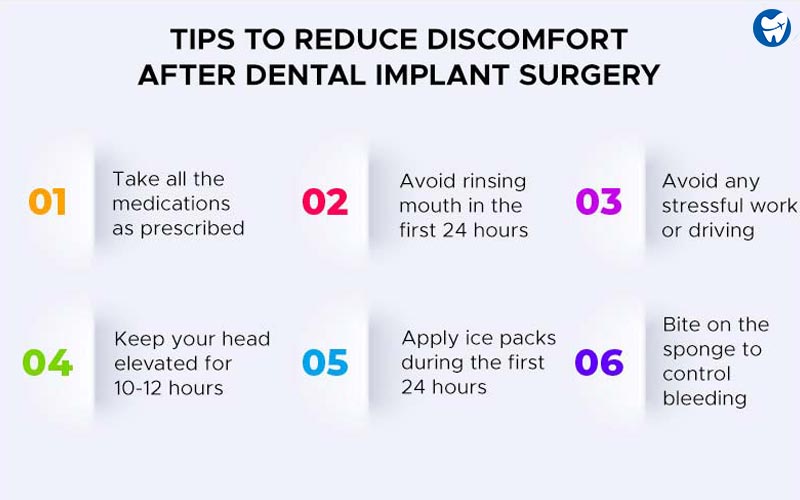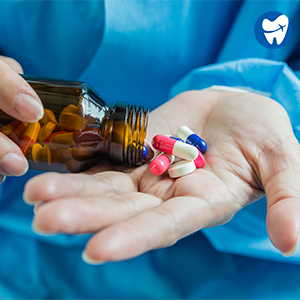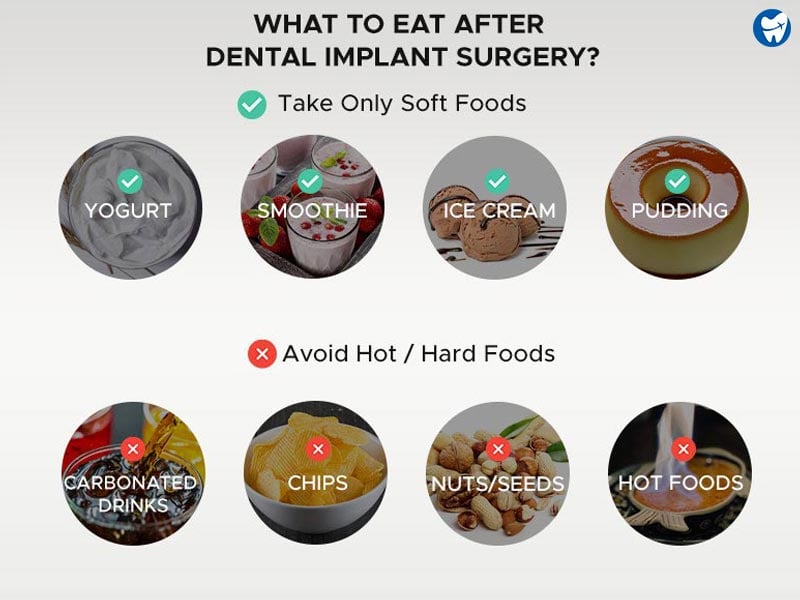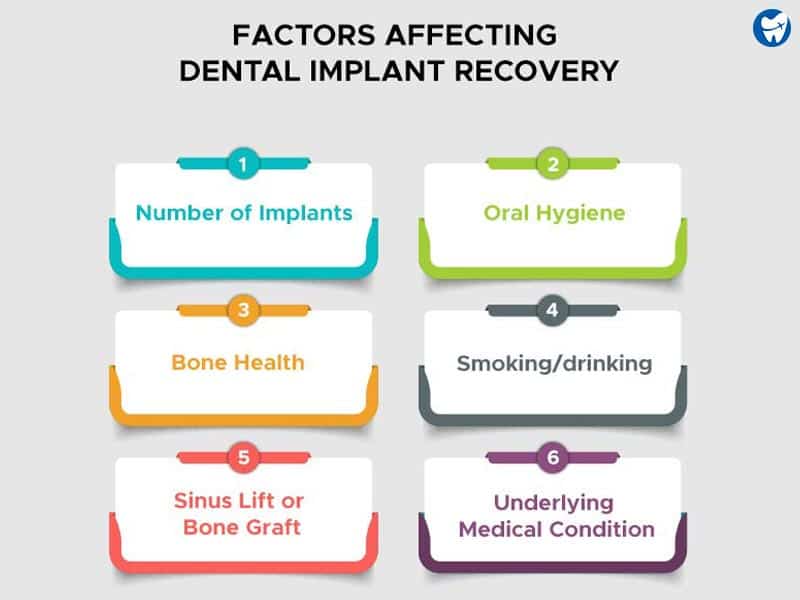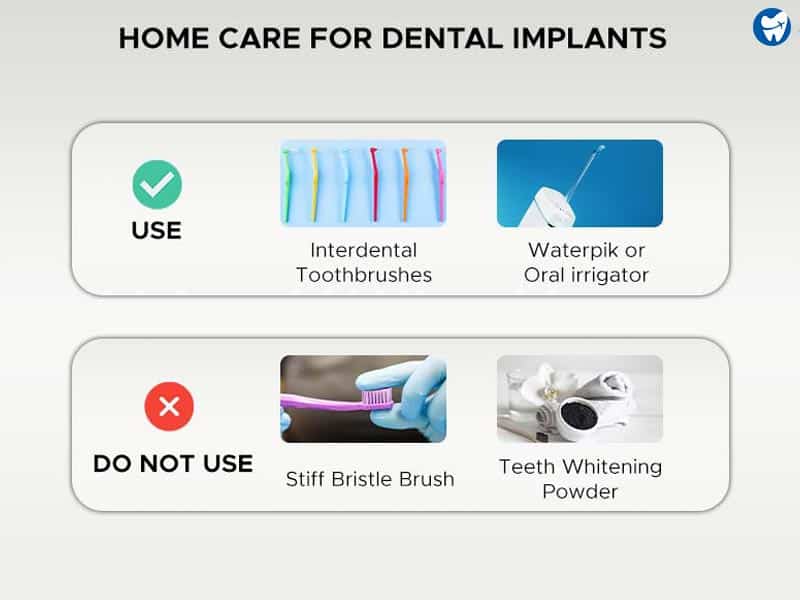Dental implants are the best choice for replacing your missing teeth. They give you the look and feel of your natural teeth. But, aftercare of dental implants is vital for their success.
You can avoid unnecessary discomfort, pain, and complications by understanding how to care for dental implants.
Video Courtesy: ERemedium
You need to follow some guidelines after surgery and for better healing and success in the long term.
Let us discuss dental implants aftercare and guidelines for maintenance for its long-term success.
Postoperative Care for Dental Implants
Caring for your implants immediately after surgery is essential as it is common to experience bleeding, swelling, and discomfort at the surgical site.
Tips To Avoid Discomfort After Dental Implant Surgery
In the postoperative period, you should minimize touching your implant even with your tongue and let it heal independently.
You may face issues like bleeding, swelling, and pain. But, with proper care, and time, these issues get resolved.
Bleeding of the surgical site might continue for a few hours after surgery. Keep a damp gauze and gently bite it over the surgical site to control this bleeding.
Also, keep your head elevated.
After 30 to 40 minutes, remove the gauze to check, and if needed, keep another gauze for the next 30 minutes.
The bleeding usually stops within 4 to 6 hours.
However, you may have blood-tinged saliva for 2 to 3 days after surgery.
Sleeping Head Elevated
Sometimes light bleeding continues for two days, which is considered normal. [1]
To avoid the risk of excessive bleeding, keep your tongue away from the site and avoid stressful exercise for some days.
Also, stay calm, avoid forceful spitting, and smoking. If bleeding doesn’t subside, then consult your dentist.
Pain and discomfort after your surgery are normal. Your doctor will advise you to take pain medications that you should start immediately.
For severe pain, you will need narcotic drugs, which may make you drowsy.
While taking these medications, avoid driving or working on any machinery.
If you feel any severe pain, consult your dentist.
Do not take any new medicine without consulting.
Medicines
Swelling is our body’s normal reaction to any injury. [2] The swelling may start 24 hours after surgery and reach its peak in 2 to 3 days.
However, it subsides within 7 to 8 days.
Immediate use of an ice pack after surgery generally reduces the severity of swelling.
Hence, in the first 12 hours after surgery, you should apply ice packs at regular intervals.
Also, keeping your head elevated while sleeping reduces the risk of swelling.
Ice pack to reduce swelling
After 48 hours, you can use a warm compress on the side of your face where surgery was performed.
This increases blood flow to the area. The swelling starts reducing from the 4th day.
What Can I Eat After Dental Implant Surgery?
After the surgery for dental implants in Turkey, eat only soft foods like yogurt, smoothies, ice cream, or pudding for the first 6 hours until you regain feeling.
Chewing while numb can result in unnecessary trauma to the tongue and cheeks.
However, avoid eating and drinking hot foods or drinks for a few days. Spicy food should also be avoided.
Once the numbness wears off, you can safely chew solid food away from the surgical site. Be extremely cautious in avoiding the surgical area.
Also, you should avoid frequent spitting, smoking [3] , using straws, and drinking carbonated drinks.
These things can interfere with the healing process and may result in complications.
Even eating hard foods like nuts, chips, seeds, and popcorn can irritate the tissue, causing delayed healing.
Hence, increase your fluid intake and have nutritious meals to feel better and heal faster.
If you experience severe weakness and feel dizzy, call your dentist.
Oral Hygiene
Keeping your mouth clean is essential to ensure proper surgical site healing. However, rinsing your mouth or spitting is not advised for the first 24 to 48 hours.
A day after surgery, you can start cleaning your mouth with a soft brush. But, avoid touching the surgical site.
You should also rinse your mouth using warm salt water 3 to 4 times a day to encourage healing.
How Long Do Stitches Stay in after a Dental Implant?
If you are worried about how long stitches stay after the surgery, it will not be more than two or three weeks.
Your doctor will call you for suture removal and a follow-up check-up in one or two weeks. You can discuss all your concerns and follow the guidelines.
Continue eating soft food and chewing away from the surgery area for the first ten days. Also, keep your mouth clean for faster healing and recovery.
Do’s and Don’ts after Dental Implant Surgery
| Do’s | Dont’s |
| Rest and let your body heal | Do not self-medicate |
| Drink cold beverages & eat soft food | Avoid strenuous activities |
| Eat healthy, nutritious food | Don’t drink hot drinks or eat hot food |
| Take all medications | Avoid spitting, electric brushes, flossing |
| Use warm saltwater & gently brush | Avoid smoking & drinking alcohol |
FAQs
You may experience pain and discomfort up to 4 days after the surgery. Take pain medications as prescribed by your doctor.
You may also experience throat pain and difficulty swallowing for a few days. But, if pain persists for longer, then consult your doctor.
No, you should avoid taking any hot beverages for at least one week after surgery. Because of heat, blood vessels can dilate, resulting in increased bleeding.
These hot drinks can interfere with your healing process. [4] You can start drinking warm coffee after one week of your surgery.
Yes, your doctor will advise you to drink plenty of fluids after surgery. But, avoid using straw and frequent spitting and rinsing.
No, after dental implant surgery, you should avoid alcohol intake for at least three days. Later it would be best if you reduce your alcohol consumption.
According to health experts, alcohol has adverse effects on treatment outcomes. It may result in bone loss at the implant site, compromising the support area of the implant. [5]
Doctors advise avoiding any strenuous exercise for at least three days. Understand what your body needs as you resume your daily activities and exercise routines.
You should consult your doctor if you experience any pain, swelling, or bleeding.
You may have to put your smoking habit on hold for about eight weeks after the procedure.
As nicotine increases your heart rate and blood pressure, it becomes difficult to get the needed oxygen in your body. [6]
It reduces the blood flow to the wound. Hence, smoking is not advised for proper wound healing, which may take a few weeks.
As mentioned earlier, any alcohol consumption is not advised for the first three days after surgery.
It interferes with the healing process and may also interact with your medications.
You can brush the same day after your surgery, but be gentle and avoid touching the surgical site. Also, use a soft brush and do manual brushing.
But, do not use an electric brush and avoid vigorous swirling. Around three days after the surgery, you can gently brush the surgical site.
Avoid using straw for at least one month after dental surgery. Straw creates a sucking motion which can interfere with the healing process.
Hence, it’s best to avoid straw till the tissue around the implant heals completely.
Looking for hassle-free, affordable implant surgery?
Yes, please!Caring While Healing – Dental Implant Care after Surgery
Dental implant surgery doesn’t just end the process. Your recovery period can be longer and a bit discomforting. It is when the injured oral tissue heals and fuses with the implant.
Around two weeks after the surgery, a healing abutment will be placed. [7] The abutment is removed for the crown placement when the healing is complete.
Focus on aftercare of your implant post-surgery to aid in recovery and to avoid complications.
Recovery Time
Every individual is different; hence recovery time varies in each. Also, there are a few factors that affect your recovery time, like:
Factors affecting dental implant recovery time
With more implants, it might take longer to heal. Also, it is found that the lower jaw bone can heal faster when compared to the upper jaw. [8]
What Happens During Healing
Your oral tissue heals, and a process called osseointegration takes place. [9] It means your implant becomes integrated with the bone.
Usually, it takes about 5 to 7 months for this fusion to occur.
Do’s and Don’ts of Recovery Period
| Do’s | Don’ts |
| Eat a balanced diet | Don’t eat hard & chewy food |
| Stay hydrated to help your body recover faster | Do not use abrasive toothpaste or whitening agents |
| Brush twice a day with a soft-bristle toothbrush | Avoid smoking to lessen the risk of infection & implant failure |
| Use antibacterial mouthwash for effective control of plaque formation | Avoid sugary, sticky food that causes plaque formation |
FAQs
Peri-implantitis is an infection affecting the soft and hard tissues surrounding the implant. During peri-implantitis, the gums get inflamed, and you may experience bone loss around the implant. [10]
It affects implant stability and retention. You may experience low to moderate pain around the surgical area.
With the healing of a dental implant, your pain reduces and gradually disappears. But, if you are experiencing severe pain, discomfort, and swelling around the dental implant, it is a sign of implant failure.
Consult your doctor immediately for any symptoms.
Seven common signs that show dental implant infection:
- Pain and discomfort in the area
- Redness and swelling of gums
- Difficulty in chewing
- Bleeding gums
- Loose implant
- Bad breath
- Fever
Visit your dentist for regular evaluation. Your dentist can diagnose and treat the infection, avoiding further complications.
Your recovery time may take a few weeks to 6 months and sometimes even a year. The lower jaw heals faster and complicated surgeries can delay the healing process.
Depending on your healing, you may have to stick to soft food for 10 to 14 days after surgery.
Once the recovery is complete and your pain disappears, you can start eating hard foods. Still avoid hard, sticky, and chewy food.
After the surgery, you need to follow your doctor’s instructions to facilitate proper healing.
Your dentist will insert a healing abutment which will be replaced with the crown after complete recovery.
Few tips for healing faster after dental implant surgery:
- Use ice packs to minimize bleeding and swelling
- Rinse your mouth with warm saltwater
- Avoid eating hard and sticky food
- Eat nutritious, healthy food
- Maintain oral hygiene
- Stay hydrated
- Don’t smoke
- Rest well
Long Term Care for Dental Implants
Apart from professional dental implant care provided during surgery, home care is essential to long-term success.
After successful surgery and healing of dental implants, you should not stop caring for them.
Dental implant care and maintenance should be done routinely for their long-term success.
If neglected, it may develop plaque and tartar, causing gum infection. Eventually, plaque deposits may cause bone loss and loosening of the implant.
If you are wondering about what maintenance is required aftercare, here are some tips:
Home Care for Dental Implants
Many face complications because of not following good oral hygiene. Brushing twice daily and flossing regularly to remove food residue are essential.
How To Take Care of Your New Dental Implants at Home
It’s a stiff bristle brush, abrasive toothpaste, and any teeth whitening agent.
Visit Your Dentist Regularly
Regular visit and evaluation from your dentist is another essential aspect of dental implant aftercare.
After complete healing and placement of the crown, your dentist may schedule appointments every six months.
Follow your dentists’ instructions about caring for your implants. Consult your dentist immediately if you experience any pain and discomfort after the healing period.
Early Detection of Infection Is the Key
If you experience pain, discomfort, or difficulty chewing, you should visit your dentist immediately.
Early detection of infection can prevent bone loss and loss of support structure of the dental implant.
Modify Your Lifestyle Habits
For the long-term success of your implant, you should avoid smoking.
Also, engaging in contact sports or chewing ice cubes can weaken your implant.
You can enjoy eating your favorite foods but be cautious while eating hard foods.
Do’s and Don’ts of Long-Term Care
| Do’s | Don’ts |
| Eat nutritious, calcium-rich food | Stop smoking |
| Visit your dentist every six months | Avoid hard & sticky food |
| Use mouthguard for teeth grinding | Do not neglect any pain or discomfort |
| Clean your implants properly; use an interdental brush & Waterpik | Avoid habits that can damage your implant, like eating ice cubes or candy |
Final Word
Dental implants were designed to feel and look like natural teeth. They improve your speech, eating and provide comfort and convenience.
With proper care, implants can last for several years and even a lifetime.
However, your commitment to good oral hygiene and a healthy lifestyle contributes to the longevity of your implant.
FAQs
Good oral hygiene habits like brushing twice daily, flossing, using water irrigation devices are some of the standard practices advised for post-dental implant care at home.
Tips for taking care of dental implants:
- Use a soft bristle brush and brush twice a day
- Brush around your implant to remove any debris
- Unwaxed-floss or as recommended
- Recommended irrigator for cleaning
- Schedule regular check-up
Yes, Waterpik is an effective and safe tool for cleaning your implants. Waterpik has a specialized tip that removes food debris from inaccessible areas and helps to avoid plaque buildup.
There is less chance of food getting stuck under the surgical area. But if you feel that food is getting stuck or any discomfort while eating, you should get it checked by your dentist.
Regular brushing and flossing are enough to get rid of plaque and biofilm. But if there is hard calculus, you may need professional cleaning. Visit your dentist.
Yes, the healing abutment inserted after surgery allows the gums to heal around it. The space around the implant enables the gums to grow and attach themselves to the implant.
It is designed as a permanent solution and can last for a lifetime with proper care. Generally, only the crown needs replacement in 10 to 15 years due to wear and tear.
No, dental implants are fixed prostheses and cannot be removed. It can be cleaned by brushing twice and following routine oral hygiene maintenance methods as advised by your dentist.
Related Resources
- Dental Implants in Turkey
- Dental Implants in Izmir
- Dental Implants in Antalya
- Dental Implants in Istanbul
- Cost of Dental Implants in Thailand
- Immediate Load Implants in Thailand
- Zimmer teeth implants in Thailand
- Dental Implant Surgery Cost in Phuket
- Teeth Implants in New Delhi
- Same-day Implants Cost in India
- Dental Implants in Chandigarh
- Zygomatic Implants in India
Exploring further? May the floss be with you!
Get best aftercare tips!
